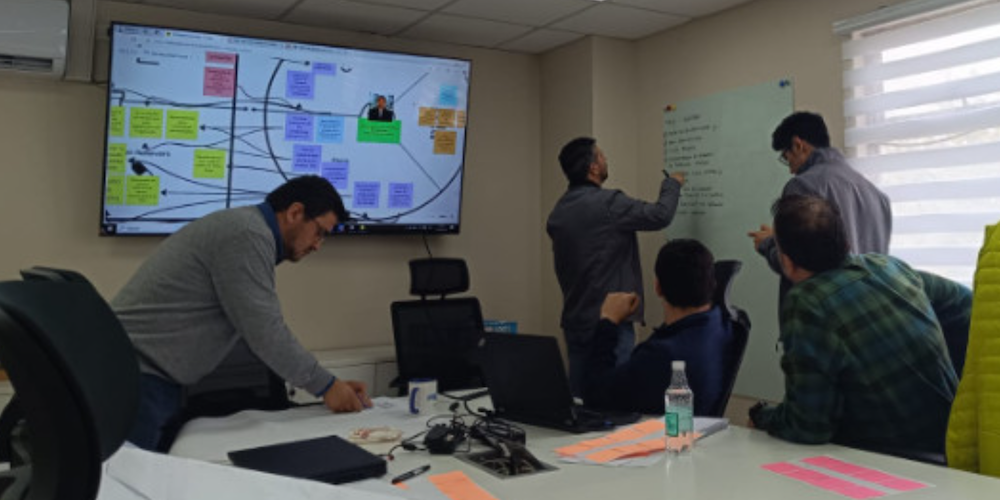
Technology causes the market to shift towards the customer
OPINION – A new publicly owned open-source technology promises to make direct, unmediated trade relations trustworthy, opening the door to an era of democratization and cooperation in global commerce.
Words: Boaz Tamir, Founder and President, Israel Lean Enterprise
We live in a world of social unrest, economic disparity and market centralization caused by monopolistic powers being concentrated in the hands of a small group of financial giants.
In the midst of these trends, however, the first signs of a shift are emerging: technological advances aim to change the existing economic order from a market dominated by both central banks and giant brands to a decentralized system comprised of blocks of socio-professional networks.
Let's take the blockchain technology as an example. It makes it possible to manage the traffic of contents and to guarantee the trustworthiness of users in barter transactions and unmediated peer-to-peer decentralized services, and both enables and secures the integrity of collaboration attempts within professional, multi-disciplinary networks.
In a blockchain network, the database is not located in a single central site. Instead, information is collaborative and updated simultaneously among all the individuals and organizations using it. There is no manager who can change the rows of the database at will. All information is encrypted, each participant testing and confirming the activities in course and ensuring the network is being managed in full transparency and according to the strict rules of the game (standards).
An example is the virtual currency Bitcoin, which has proved the effectiveness of a protected blockchain system, making third-party (whether banks or financial networks) mediation and control unnecessary.
The blockchain technological platform could potentially decentralize the control and management of the market, by transferring fiduciary responsibility from a single (private) business entity – the owner of the application or the banking institution – to the community of users: each user is simultaneously a customer, a referee, and a "trustee" of the other members of the community.
The new technology enables the trust-based maintenance of a system for managing the account books, and of a public and virtual clearing house with no central control by a business charging commissions for the fiduciary services it offers.
But blockchain is not the first example of groundbreaking technology revolutionizing the business world. We saw the first signs of the undermining of the status quo towards the end of the 1990s, when Napster (just to mention another famous example) showed music lovers how to share files, thus weakening the position of record labels, which had dominated the industry till then.
This breakthrough, which we could define as a Generation 1.0 global network, has since become institutionalized, led by disrupters like Apple and Amazon. Effectively, these organizations ran a global market linking suppliers and private customers (a Generation 2.0 social global network).
A number of other disruptive players followed. Think of lodging network Airbnb, which connects private home owners with tourists who prefer private accommodation to a hotel, or Uber, which connects private vehicle owners with people who need to go from point A to point B but would like to find alternative transportation system.
In Generation 2.0, control of the market remained partially centralized and was assigned to owners of the application whose trustworthiness had been proved and accepted by the users. The economic value of an application – for example, global trade company eBay – was measured by the level of trust of the community of users when it came to upholding the clear rules of the game and guaranteeing the completion and reliability of every transaction they were involved in (including the prevention of exploitation, the safeguarding of the confidentiality of the information, the management of the money and merchandise, and the enabling of credit card or PayPal payment). The decentralization of the "fiduciary" role dramatically changes the nature of the market and opens the way to Generation 3.0 social global networks.
In 2011-2012 protests against the financial powers, organized by groups such as Occupy, swept industrialized countries and made a dent in the status of global banking and capital markets in New York and London. The spread of Generation 3.0 social network technology (for example, Backfeed) will make it possible to circumvent banks altogether when carrying out transactions and will thereby shake the very foundations of the financial industry.
The revolutionary potential of these developments is already becoming evident. Blockchain technology, which I discussed earlier, is redesigning the global financial and professional trade system, paving the way to crossing boundaries of diverse socio-cultural-technical relations, and decentralizing the control and ownership of intellectual property (IP).
The recent cover stories in The Economist and Financial Times on the development of the "trust machine" technology are testament to the great importance that the international financial system ascribes to the blockchain technology's potential for change. And traditional organizations are already devising a response: software giant IBM is forging a collaboration with open-source software developer Linux (in general, banking, software, information systems, and accounting giants are coming together to study what the outcome of this revolution might be).
The development of these new technological networks is interlocked with management systems and corporate governance transformations: IT has replaced traditional hierarchy with the idea of a "flat organization," the command-and-control approach with communities of multidisciplinary and agile working groups, and management by objectives with management by collaborative learning and universal engagement on problem solving.
THE SIGNIFICANCE OF THE CHANGE
Changes in the nature of the market will give customers the freedom to choose value-creating products and services. At the same time, as the extraordinary growth of the Lean Startup movement testifies, new players and entrepreneurs will find it easier than before to enter the global market, if they are bold enough to let the global community of users test their service and products.
THE TRANSITION FROM COMPETITION TO COOPERATION
Transparency, integrity and cooperation are taking center stage, with customers demanding the rules of the games be made clear and respected and challenging the excessive power in the hands of the kings of the market. Where an ethical, trustworthy relationship is guaranteed, customer freedom of choice generates open, real and fair competition (based on validated value creation) that is a result of the balance between the quality of the supply and the needs of the demand.
The winners in the market will be those who make it their corporate purpose to find ways to tailor the proper value proposition.
CREATING VALUE AS A CONDITION FOR SURVIVAL
In Generation 3.0, knowledge workers, independent business owners and consultants, and companies are organized for collaborative activity within a value-creating professional network. Customers are organized in virtual buying communities and are given the opportunity to grade each value creator so as to provide other customers with the chance to make a free and informed decision on which suppliers to rely upon. It is the creation and delivery of value, not the degree of centralization or control of the market, which determines the status of a business.
The unfolding Generation 3.0 revolution is not only counteracting the trend of business centralization; it also has the potential to fight the trend of rising socioeconomic inequality – two developments that pose a threat to the values of liberal-democratic society. Opening the market and transferring the ownership of trade in products, services, and information from private hands to the public constitute the vital basis for sustainable economic growth.
THE AUTHOR

Read more


FEATURE – Lean Institute Brasil is running pioneering lean experiments in agriculture. The authors reflect on the challenges of transforming traditional farming culture and the opportunities lean affords.


INTERVIEW – Lean is making inroads in the Middle East! In this interview, a Senior VP of Gerab National Enterprises tells us how the company is using lean to reinvent itself as a project management firm.


FEATURE – ME Elecmetal in Chile applied Lean Product and Process Development to cut lead-times, boost collaboration, and build a sustainable system for innovation.


FEATURE – In this compelling theoretical piece, the author reminds us how in a lean organization relations are structured around learning opportunities rather than execution. This is what ultimately enables a company to grow.

